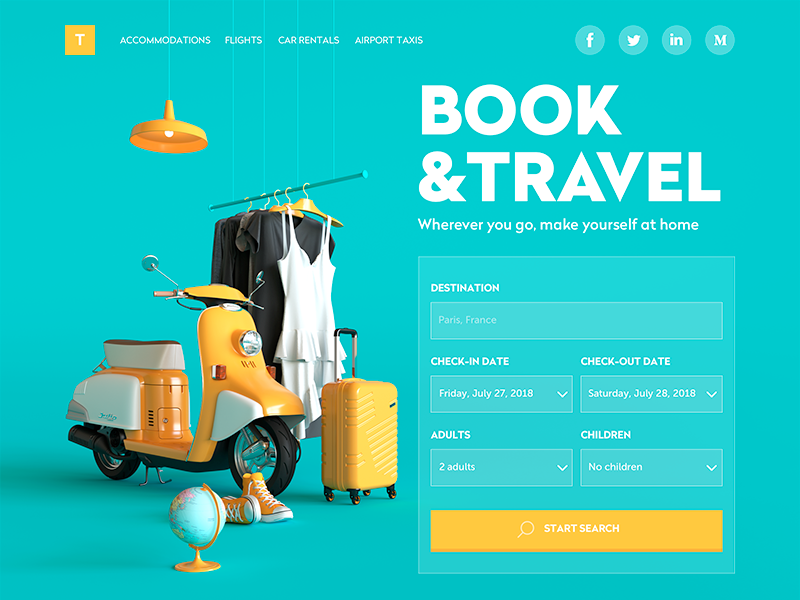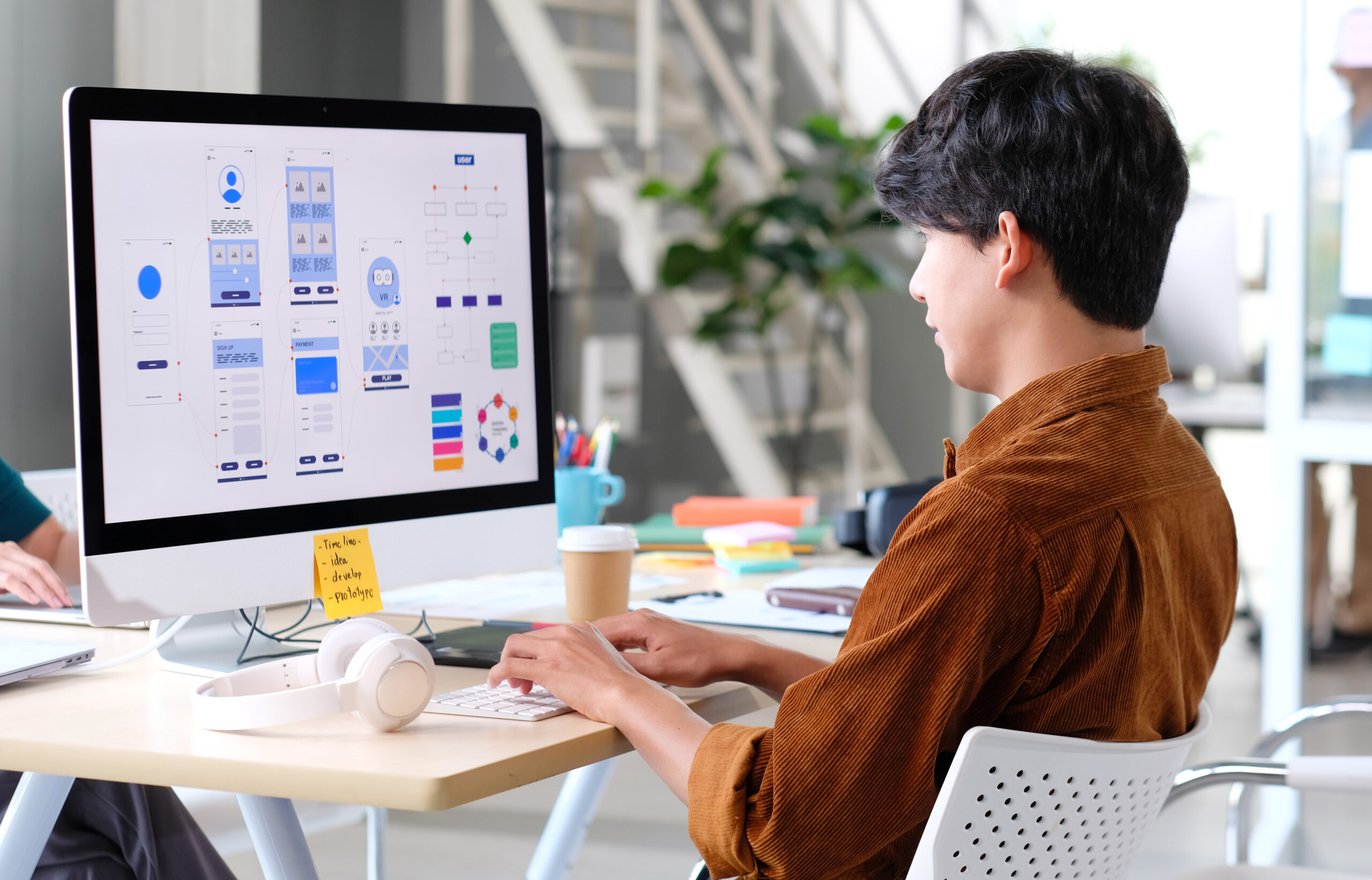How to Properly Integrate Visual Appeals and Capability in Web Layout
When creating a website, you need to strike an equilibrium between looks and functionality. It's not just about looking excellent; your layout ought to likewise offer an objective and guide users successfully. By concentrating on simpleness and intuitive navigation, you can produce an engaging experience. However what components absolutely enhance usability while preserving aesthetic charm? Let's check out the essential principles that can result in a harmonious mix of appeal and feature.
Recognizing the Relevance of Visual Appeals and Performance
Understanding the balance between looks and functionality is important for creating an effective user experience when you make a website. A visually enticing site grabs interest, but it's the capability that maintains users involved. If your website looks excellent however is challenging to navigate, site visitors will rapidly lose passion and leave.Consider your target market and what draws them in. You desire to develop a style that mirrors your brand name while making sure simplicity of usage. Streamlined formats, user-friendly navigation, and clear phone call to action can enhance both visual appeals and functionality.

Concepts of Effective Website Design
To produce a reliable web design, you need to stick to numerous vital principles that improve both individual experience and aesthetic allure. Initially, prioritize simplicity; a clean layout helps individuals navigate easily. Use a regular color system and typography to maintain coherence throughout your website. This promotes experience and trust.Next, assure your layout is responsive. Users access web sites on different devices, so your layout needs to adjust seamlessly. Pay attention to aesthetic power structure; highlight essential components with dimension, placement, or color to lead individuals' focus.Finally, integrate enough white area. It avoids mess and makes content much more digestible. Keep in mind, efficient website design balances aesthetics and performance, so every design selection need to serve a function. By complying with these concepts, you'll develop a site that's not only visually attractive yet additionally user-friendly, eventually maintaining site visitors engaged and motivating them to return.
Focusing On Individual Experience
When prioritizing individual experience, you'll intend to start by understanding what your users genuinely require. Streamlining navigation design can make a substantial difference in exactly how quickly they find what they're searching for. Improving visual hierarchy aids assist their interest to the most important components on your website.
Comprehending User Demands
Understanding customer requirements is necessary for creating an interesting web experience that maintains visitors returning. To accomplish this, you have to determine the goals and preferences of your target audience. Beginning by conducting customer research, like studies or meetings, to collect insights on what customers value most. Pay interest to their discomfort points and difficulties when interacting with similar internet sites. This info allows you to tailor your style, making certain performance straightens with customer expectations. Furthermore, take into consideration creating individual identities that stand for different segments of your audience, assisting you envision their needs during the style procedure. When you focus on understanding individual requirements, you develop a website that not only looks excellent yet also delivers a smooth, satisfying experience that cultivates commitment.
Simplifying Navigating Layout

Enhancing Visual Hierarchy
A strong aesthetic power structure is crucial in leading customers with your site and ensuring they involve with crucial material. To achieve this, make use of spacing, dimension, and color strategically. Make vital aspects like headings larger and bolder than body message, drawing attention immediately. Make use of contrasting colors to highlight phone call to activity, encouraging clicks. In addition, utilize ample white room to separate areas, making content absorbable and inviting.Consider the flow of details; set up elements practically, leading individuals' eyes from one point to the following. Usage visual cues, like arrows or lines, to guide focus. By prioritizing aesthetic pecking order, you boost individual experience and increase the probability of conversions, guaranteeing your web site is both aesthetically pleasing and functionally efficient.
Color Concept and Its Effect On Functionality
While picking the best shades for your website might appear like a minor information, it greatly influences use and user experience. Color influences how individuals regard information and can hinder or improve navigating. Contrasting colors can help crucial components stand out, making it easier for site visitors to locate what they need.Additionally, consider the psychology of colors: blue typically influences trust fund, while red creates urgency. Knowing your target audience can assist your shade selections, assuring they reverberate well.Moreover, regular color schemes aid build brand name identification, making your website much more memorable. Nevertheless, be careful-- as well lots of colors can overwhelm users. Stay with a restricted combination that complements your content and keeps clarity.Incorporating accessibility is additionally crucial; validate your shade that site combinations are friendly for those with aesthetic problems. By attentively applying color concept, you'll improve functionality and create an extra interesting individual experience.
Typography: Balancing Design and Readability
Color options established the stage for your internet site, however typography plays a similarly essential function in enhancing user experience. You desire your text to connect clearly while likewise showing your brand's individuality. Begin by choosing fonts that are not just appealing but additionally readable. Sans-serif fonts frequently work well for electronic screens, as they're less complicated to check out at various sizes.Maintain a power structure by utilizing different typeface sizes and weights; this overviews users via your content easily. Think about line spacing and letter spacing; also tight can discourage visitors, while also loose can interfere with the flow. Restriction your font selections to two or 3 to keep the style cohesive.Finally, always examine your typography across various devices and web browsers. What looks excellent on one display might not on an additional. Balancing design with readability warranties that your message resonates, maintaining your audience engaged and educated.
Responsive Style: Making Looks Deal With All Gadgets
To assure your website looks great on any gadget, you'll require to embrace responsive style concepts. This strategy guarantees your site adapts to different display dimensions, providing an optimal individual experience. Start by utilizing liquid grids and adaptable photos that scale seamlessly. Instead of dealt with measurements, decide for percents and relative units, allowing your layout to readjust dynamically.Next, implement media queries in your CSS. These let you apply different styles based on device qualities, like screen width. In this manner, you can preserve aesthetic appeal while guaranteeing functionality.Don' t forget touch targets; make sure buttons and links find out are easy to tap on smaller screens. Prioritize essential content, so individuals can quickly navigate your site despite their device. By focusing on these components, you'll develop an interesting, aesthetically appealing experience that fulfills the demands of all customers, whether they get on a desktop computer, smart device, or tablet computer .
Performing Use Testing for Continual Renovation
To improve your web layout, you need to set clear use goals that align with customer requirements. By conducting customer tests, you can collect useful feedback on just how genuine individuals engage with your site. Assessing these results will certainly assist you make informed renovations and create an extra effective customer experience.
Defining Use Goals
While appearances can draw customers in, defining usability goals is essential for guaranteeing their experience remains smooth and satisfying. Begin by identifying what you want customers to accomplish on your website (website design london Ontario). Consider their jobs, needs, and habits. Are they seeking information, making an acquisition, or registering for a newsletter? Establish clear criteria to gauge success, like task completion prices or time on job. Focus on intuitive navigation, obtainable content, and responsive style to improve use. Frequently take another look at these objectives as user expectations develop. By specifying use objectives, you create a framework for assessing and enhancing your web site's efficiency. This emphasis on use not just boosts individual satisfaction but likewise strengthens the general efficiency of your layout
Performing Customer Examinations
Performing individual tests is crucial for fine-tuning your web site and guaranteeing it fulfills your audience's demands. Begin by identifying your target customers and producing a test strategy that outlines your purposes. Make use of a mix of measurable and qualitative approaches, such as studies, interviews, and task-based observations, to gather comprehensive feedback. Welcome individuals to navigate your site while you observe their interactions and keep in mind any type of difficulties they encounter. Urge open discussion to catch their thoughts and sensations concerning the style and performance. Keep sessions brief see this website and focused, ensuring you cover key locations without overwhelming customers. Lastly, make certain to record all searchings for, as this info will certainly be very useful for making educated design choices that improve both looks and functionality.
Evaluating Examination Results
How can you effectively examine the results of your use tests to drive continuous enhancement? Start by classifying feedback right into common motifs. Search for patterns in customer habits that highlight discomfort points or locations for enhancement. Usage quantitative information, like task completion prices and time on task, to measure use objectively. Don't fail to remember to consider qualitative understandings from individual remarks; they typically expose underlying issues that numbers can not reveal. Prioritize the most impactful searchings for and develop actionable products for your layout team. Bear in mind, it has to do with iterating-- apply changes, then examination once more. This cycle of testing, evaluating, and refining aids you equilibrium aesthetic appeals and capability, ensuring your site satisfies customer needs efficiently while preserving visual allure.
Frequently Asked Questions
Exactly how Do I Select the Right Color Combination for My Web site?
To pick the appropriate shade palette for your website, consider your brand's personality, target audience, and emotional effect (website design london Ontario). Usage color psychology, produce consistency, and assurance readability. Examination mixes to see what reverberates finest with visitors
What Equipment Can Assist With Website Design Aesthetics and Functionality?
You can use tools like Adobe XD, Figma, and Sketch to boost your website design's visual appeals and capability. These systems supply instinctive user interfaces, partnership functions, and pre-made design templates to improve your creative procedure and boost your styles.
Exactly How Can I Incorporate Animations Without Compromising Functionality?
To include computer animations without jeopardizing functionality, prioritize refined impacts that enhance user experience. Usage CSS animations for smoother interactions, warranty fast load times, and examination on numerous gadgets to maintain efficiency while adding visual allure.
What Are Usual Blunders to Avoid in Internet Style Aesthetic Appeals?
When developing, stay clear of messy layouts, inadequate shade selections, and irregular fonts. Do not ignore mobile responsiveness, as it can alienate customers. Verify your design lines up with your brand, developing a seamless experience that involves visitors properly.
Exactly how Frequently Should I Update My Internet site's Style for Optimum Looks?
You ought to upgrade your website's layout every 1-2 years to stay on par with fads and maintain excellent looks. Routinely restoring visuals helps engage site visitors and guarantees your site stays enticing and easy to use. When you create an internet site, comprehending the equilibrium in between visual appeals and capability is essential for producing a reliable user experience. To create an efficient web style, you require to stick to several essential concepts that boost both customer experience and visual appeal. Individuals gain access to internet sites on various devices, so your design must adjust flawlessly. When focusing on user experience, you'll want to start by understanding what your individuals genuinely require. Beginning by performing customer study, like meetings or studies, to gather insights on what users value most.